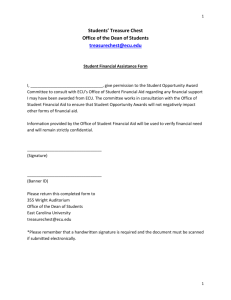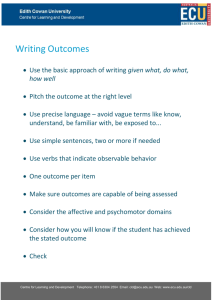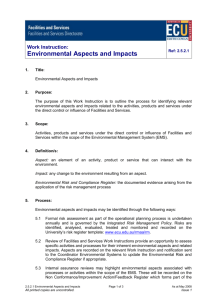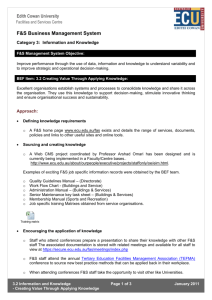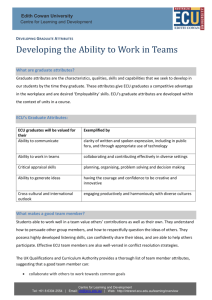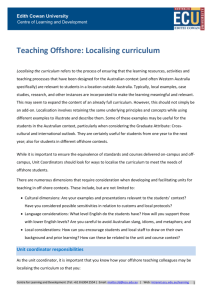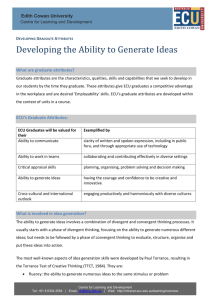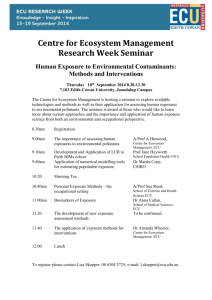WIL Assessment and Learning outcomes
advertisement
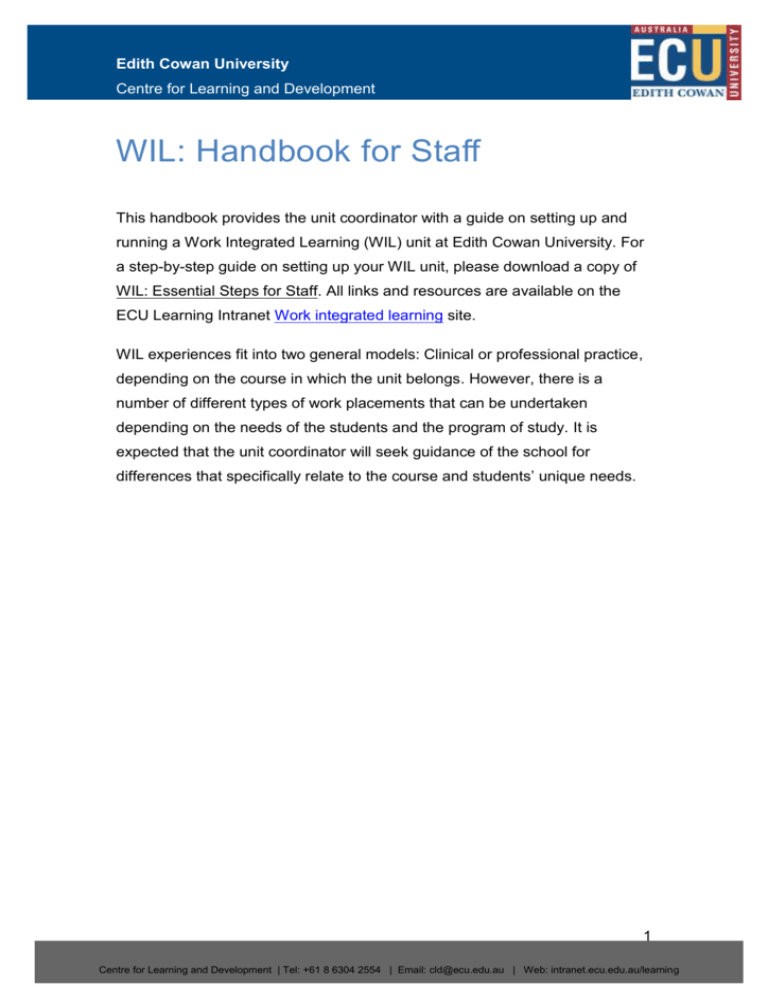
Edith Cowan University Centre for Learning Development Centre and for Learning and Development WIL: Handbook for Staff This handbook provides the unit coordinator with a guide on setting up and running a Work Integrated Learning (WIL) unit at Edith Cowan University. For a step-by-step guide on setting up your WIL unit, please download a copy of WIL: Essential Steps for Staff. All links and resources are available on the ECU Learning Intranet Work integrated learning site. WIL experiences fit into two general models: Clinical or professional practice, depending on the course in which the unit belongs. However, there is a number of different types of work placements that can be undertaken depending on the needs of the students and the program of study. It is expected that the unit coordinator will seek guidance of the school for differences that specifically relate to the course and students’ unique needs. 1 Centre for Learning and Development | Tel: +61 8 6304 2554 | Email: cld@ecu.edu.au | Web: intranet.ecu.edu.au/learning Edith Cowan University Centre for Learning Development Centre and for Learning and Development Table of Contents Set Up of Work Placements ............................................................................................. 3 Assess the risks ............................................................................................................................ 3 Insurance ........................................................................................................................................ 3 Assure mutual understanding ................................................................................................ 4 Clarify the agreement between host and student ............................................................ 4 Maintain communication with hosts and students ......................................................... 6 Record the student experiences............................................................................................. 6 WIL Assessment and Learning outcomes ................................................................... 6 Learning outcomes...................................................................................................................... 7 Placement background and context ..................................................................................... 7 Evidence of learning ................................................................................................................... 7 Assessment strategies................................................................................................................ 8 Timing of assessment ................................................................................................................. 9 Indicators of learning................................................................................................................. 9 Conclusion .......................................................................................................................... 10 Appendix 1: WIL Guidelines for ECU Staff ............................................................... 11 Appendix 2: Resources for WIL unit co-ordinators ............................................. 20 2 Centre for Learning and Development | Tel: +61 8 6304 2554 | Email: cld@ecu.edu.au | Web: intranet.ecu.edu.au/learning Edith Cowan University Centre for Learning Development Centre and for Learning and Development Set Up of Work Placements Before proceeding with organising work placements, please ensure that you have clear learning outcomes and appropriate assessment tasks directly related to these learning outcomes. This is a requirement for running work integrated learning units and is particularly important in courses that are overseen by an accrediting body, such as education, nursing and engineering. If students do not achieve the required outcomes, the accrediting body may revoke its accreditation of the course. It is essential that the workplace is able to provide the student with experiences that fulfil the learning outcomes. Make contact with the host organisation to ensure that it is a suitable choice for your students to be able to fulfil the unit outcomes. Assess the risks Once you are reasonably confident that the potential host organisation is appropriate, complete a risk assessment for each workplace that is hosting a student in your unit. Your school may have its own risk assessment system, but if not, you can use the ECU Activity Risk Register: Risk and Assurance Services > Tools and templates (link) > ECU Activity Risk Register Consider whether a workplace is high risk, such as a building site, or may lead to any unusual situations, such as extensive travelling. If there are any outstanding concerns after discussion with the host and checking their safety procedures, make a site visit to ensure that the placement is safe. Insurance You will need to access the host organisation’s Certificate of Currency before students can start their placement. This is frequently found on an 3 Centre for Learning and Development | Tel: +61 8 6304 2554 | Email: cld@ecu.edu.au | Web: intranet.ecu.edu.au/learning Edith Cowan University Centre for Learning Development Centre and for Learning and Development organisation’s website. It is not, email the host to send you a copy. Host organisations will have access to ECU insurance details and email address via the Student Practicum Risk Management Form (discussed below). Please go to Practicum, Work Experience or Volunteer Activities (link) for specific insurance details relating to work placements. If you are running a WIL event abroad, you must contact insurance@ecu.edu.au. Contact ECU Insurance if you have any concerns, or if any issues develop throughout a student’s placement. Assure mutual understanding Every student must have a completed Student Practicum Risk Management Form before going on placement. This form checks that all parties: the ECU supervisor, the Host and the student, acknowledge their responsibilities in avoiding risk. The host organisation’s Certificate of Currency must also be attached to this form. The school must approve each student’s form before the placement can commence. Once the school has approved it, a copy must be provided to and retained by: the host organisation, the student and the school: Risk and Assurance Services > Tools and templates (link) > Student Practicum Risk Management Form Clarify the agreement between host and student Whenever possible, you should provide the host organisation with a written agreement. Typically, this agreement will have two parts. I. A formal written agreement – this will differ, depending on the type of placement. However, generally speaking: 4 Centre for Learning and Development | Tel: +61 8 6304 2554 | Email: cld@ecu.edu.au | Web: intranet.ecu.edu.au/learning Edith Cowan University Centre for Learning Development Centre and for Learning and Development Professional placements: A letter to the host organisation should be sufficient. Please contact the Legal Services for a sample letter: Student Placement Letter. OR Clinical placements: Usually a more thorough agreement, such as the Host organisation agreement template. Please contact the Legal Services for this agreement: OR The host organisation may use its own placement agreement. If you receive such an agreement, but are uncertain about whether the agreement is acceptable, please contact the ECU Legal Services for advice. II. A WIL host handbook The WIL host handbook should include the specific requirements of students and the host organisation for this particular placement. Please include: The nature and purpose of the placement and what work is to be undertaken The number of hours to be worked or the duration of the experience The hours of work, any dress requirements and any other conditions imposed by the Host The supervision responsibilities of Host and University staff; The Host’s and the University’s obligations in respect of occupational health and safety (OHS) and insurance cover; The intellectual property rights of the Host, University and student; Any other specific responsibilities of the Host, University and student (including additional requirements, such as police clearances and working with children checks) A copy of WIL: Guidelines for Host Organisations in Host Handbook Students should similarly be provided with a WIL student handbook. The student handbook should include a copy WIL: Guidelines for Students. 5 Centre for Learning and Development | Tel: +61 8 6304 2554 | Email: cld@ecu.edu.au | Web: intranet.ecu.edu.au/learning Edith Cowan University Centre for Learning Development Centre and for Learning and Development Maintain communication with hosts and students Throughout the placement, maintain regular contact with both the host and students. By responding quickly to any problems that emerge, the majority of problems can be resolved before they become serious. Provide a method to ensure you continue to receive feedback during the placement. This may be part of the assessment, or in addition to it. If any problems arise that may involve insurance, please contact insurance@ecu.edu.au at Risk Assurance Service Centre for advice. Record the student experiences All placement data for each student must be kept by the school. All placement unit records should be kept using SONIA Online (link). Ask your students to upload their Student Practicum Risk Management Form to their SONIA records. WIL Assessment and Learning outcomes Student assessment is an essential component of WIL and should be built within the context of the skills that must be achieved by students over their course of study. The aim of WIL is to provide an authentic learning experience that enables students to relate generic and disciplinary knowledge and practical skills both from university to the workplace, and from the workplace to their university studies. Assessment tasks in WIL units should likewise be authentic, allowing students to demonstrate their skills, knowledge and achievements that can be built up over the students’ course of study. The following section breaks down the process for unit coordinators when designing or revising assessment tasks for WIL units. 6 Centre for Learning and Development | Tel: +61 8 6304 2554 | Email: cld@ecu.edu.au | Web: intranet.ecu.edu.au/learning Edith Cowan University Centre for Learning Development Centre and for Learning and Development Learning outcomes Identify which course level learning outcomes and (when available) which professional competency requirements are encompassed in this unit. Decide how each of these learning outcomes and the unit learning outcomes will be assessed during the placement. These may include: Discipline specific theoretical knowledge; Professional competencies and knowledge; Professional skills, such as communication and team work; Personal development and transformative skills. Placement background and context Differences in student placement experiences will affect the design and implementation of assessment strategies. Assessment choices in your WIL unit depend on the planned student experience. Ensure that assessment tasks will be achievable to students in any placement location. If there are any specific requirements that should be covered in the course of the placements, this should be discussed with the host before the placement begins and outlined in the WIL host handbook or in the WIL host handbook or the student placement letter. Evidence of learning When designing the assessment task, consider how the completion of this task will indicate to you that students have achieved the learning outcomes. Create a clear rubric or marking guide for each assessment task directly linked to the learning outcomes. Provide this rubric to the students and hosts (if they will be assessing the students) at the beginning of the placement. This rubric can be included in the WIL host and WIL student handbooks. It is essential that students recognise what learning outcomes they have achieved and where they are in terms of being ready for graduation. Well7 Centre for Learning and Development | Tel: +61 8 6304 2554 | Email: cld@ecu.edu.au | Web: intranet.ecu.edu.au/learning Edith Cowan University Centre for Learning Development Centre and for Learning and Development structured assessment tasks can provide students with tangible evidence of their learning. They can use this evidence in their portfolio to demonstrate their skills, knowledge and abilities as well as their work readiness. Assessment strategies Consider what would be most effective to ensure students achieve the learning outcomes and provide students with tangible evidence to demonstrate their developing graduate capabilities. Assessment task types frequently used include: Learning portfolio or ePortfolio workbook completion; Webfolio creation; Report, plan or product created through the placement; Research report based on data collected on placement; Case study of placement site or organisation; Video presentation; Report by host supervisor or other professional based on observation of a skill or performance; Report by host supervisor based on whole placement. Assessments should be based on work that has been achieved over a period of time, with students being provided feedback throughout the unit. This is important in any unit, but is particularly important in a placement unit, where students may have little external support to know that they are working towards achieving the learning outcomes. Showing that they are reflecting on their learning experiences throughout the WIL unit is an essential element to their placement to ensure they understand the process they are going through. To ensure students are learning from their experience, ask students to complete regular reflections through the use of an activity log, blog, journal or online discussions. Provide feedback to 8 Centre for Learning and Development | Tel: +61 8 6304 2554 | Email: cld@ecu.edu.au | Web: intranet.ecu.edu.au/learning Edith Cowan University Centre for Learning Development Centre and for Learning and Development students also through this process. Students can also reflect on the workplace experience once it is completed Timing of assessment You may consider including an assessment task before students go on placement. This can allow you to identify whether students are fully prepared for entering a professional environment. Appropriate assessments include checking prerequisite knowledge and checking students understanding of workplace occupational health and safety standards. During the workplace, ongoing reflections targeting the learning outcomes and professional competencies allow students to recognise and document their development in these skills. If the assessment task requires students to provide tangible evidence of their learning experience, this provides them an artefact that can add to their portfolio to showcase their skills. Break down the assessment task over the time spent on placement to ensure you or the host has the opportunity to provide feedback. This also gives students more than one opportunity to demonstrate their competency at that skill. After the WIL placement, provide a debriefing opportunity to allow students to recognise their achievements and reflect on what they still need to achieve. As a final assessment task, you could ask students to link evidence of their achievements to the learning outcomes provides students with tangible evidence of the skills they have developed. This could be achieved as a formal reflective report or using the discussion board on Blackboard. Indicators of learning It is important that students are assessed in the WIL environment. While as unit coordinator, you are responsible for overseeing assessment, a range of people may be involved in the process of assessing student work. Other than yourself or other academic staff at the university, assessors may be: 9 Centre for Learning and Development | Tel: +61 8 6304 2554 | Email: cld@ecu.edu.au | Web: intranet.ecu.edu.au/learning Edith Cowan University Centre for Learning Development Centre and for Learning and Development Workplace supervisors; Industry specialists who have some contact with the student; The student’s peer or peers; The students themselves. It is crucial that you provide all assessors with a clear rubric or marking guide and check all assessors understand what is expected of them. Please be aware that assessors from the WIL setting may require training on how to mark using a rubric. To ensure consistency of marking: Check the rubric indicators are based on the specified learning outcomes; Check the rubric indicators are clear for all assessors. Be aware of potential marking biases (e.g. cultural issues and subjectivity) and have a strategy on how to deal with this; Moderate marking to ensure that results are equivalent over different workplaces with different assessors. Conclusion The Centre for Learning and Development offers WIL related workshops throughout the year. For a list of current WIL workshops, please visit the Staff Development Courses. For support on setting up and running your WIL unit, please contact the Centre for Learning and Development: CLD@ecu.edu.au. 10 Centre for Learning and Development | Tel: +61 8 6304 2554 | Email: cld@ecu.edu.au | Web: intranet.ecu.edu.au/learning Edith Cowan University Centre for Learning Development Centre and for Learning and Development Appendix 1: WIL Guidelines for ECU Staff Work Integrated Learning GUIDELINES FOR ECU STAFF It is important for all ECU staff associated with work integrated learning (WIL) activities or placements be aware of the ECU WIL policy and associated guidelines. These documents are intended to: (i) promote good practice in relation to the management of all WIL placements and other activities; (ii) ensure that student WIL placements and other activities are conducted in a manner that will minimise risk to students, the Host and ECU; and (iii) identify the respective responsibilities of staff, students and the Host. The guidelines in this document identify a minimum standard required by ECU staff when planning and conducting WIL activities. The University recognises that Faculties and Schools may undertake more detailed processes than identified in these guidelines, to satisfy their specific disciplines. 1. STAFF RESPONSIBILITY 1.1 General Responsibilities The Unit Coordinator, in conjunction with the Placement Coordinator and / or other ECU staff members (in whatever capacity, title and role) (if applicable), is responsible for planning the WIL activity in a manner that mitigates the risk for the University, student and the Host. During the planning, the following administrative procedures are to be implemented: (i) Risk Assessment Conduct a risk assessment prior to the appointment of a new Host. If the risk assessment indicates a high-risk working environment, then a site visit should be conducted. The Host must have processes in place to ensure that students are aware of and receive adequate training in workplace safety requirements and any other specific workplace requirements, including reasonable adjustments for students with disabilities. In instances where no formal agreement exists between ECU and the Host Organisation, students are required to complete the Work Placement Risk Management Form attached to these guidelines, and to return them to you prior to the commencement of the placement. 11 Centre for Learning and Development | Tel: +61 8 6304 2554 | Email: cld@ecu.edu.au | Web: intranet.ecu.edu.au/learning Edith Cowan University Centre for Learning Development Centre and for Learning and Development (ii) Document WIL activity arrangements Finalise an agreement or other documentation to set out the terms of the WIL arrangements as detailed in the Workplace Integrated Learning Procedures. The level of detail and formality that is appropriate for an agreement relating to a WIL activity will vary. (iii) Insurances Ensure that the student and Host are aware of the insurance provided to students on unpaid WIL activities. These insurances include: General (Public) Liability, Personal Accident, Professional Indemnity and Medical Malpractice (where applicable). To arrange insurance cover for student placements outside Australia, contact insurance@ecu.edu.au. Certificates of Currency are available on http://intranet.ecu.edu.au/staff/centres/risk-andassurance-services/insurance. If the student is paid for work during the placement, then the host organisation must provide workers compensation insurance for the student. A student may undertake paid and unpaid work at the same Host. For unpaid work components, the ECU insurances (noted above) apply but for the paid work component the Host insurance applies. Where a student is the recipient of an industry funded scholarship and not deemed an employee of the host, ECU insurance will cover that student. For further queries regarding ECU’s insurance, contact insurance@ecu.edu.au. (iv) Records Management Ensure all administrative management of WIL activities uses the preferred University Student Placement system, SONIA, and records management is according to ECU’s Record Management Policy. 1.2. Specific Supervisory Responsibilities to the Student All students should be provided with a copy of the ECU WIL Guidelines for Students, or a Unit Handbook that details the responsibilities of all parties involved in WIL placements. The ECU Unit Coordinator, in conjunction with the ECU Supervisor and / or other ECU staff members (in whatever capacity, title and role) (if applicable) should be aware of his or her responsibilities to the student, including: (i) providing adequate information (including assessment requirements) to students about specific WIL activities through unit outlines, unit plans and induction programs; (ii) ensuring that students are adequately informed about any legislative or Host imposed requirements for undertaking a WIL activity (e.g. Working with Children Clearance, Criminal History Record Check, immunisations, First Aid Certification, etc.) and any additional associated costs of a placement that are 12 Centre for Learning and Development | Tel: +61 8 6304 2554 | Email: cld@ecu.edu.au | Web: intranet.ecu.edu.au/learning Edith Cowan University Centre for Learning Development Centre and for Learning and Development compliant with the provisions of the Higher Education Support Act 2003 (Cth); (iii) ensuring that students are aware of the respective rights and obligations of themselves, the Host and the University concerning any intellectual property developed during placements; (iv) regularly monitoring students’ performance during WIL activities in consultation with Host supervisors and ensure that timely feedback is provided to students; (v) arranging for the implementation of the requirements of any Learning and Assessment Plan; and (vi) maintaining regular contact with students throughout WIL activities including attending workplaces and assisting with the resolution of any difficulties experienced by students. 1.3. Specific Responsibilities to the Host The ECU Unit Coordinator, in conjunction with the ECU Supervisor and / or other ECU staff members (in whatever capacity, title and role) (if applicable) should be aware of his or her responsibilities to the Host, including: (i) providing the Host with a copy of ECU WIL: Guidelines for Host Organisations or alternative documentation that that provides an outline to Host supervisors about ECU’s expectations of WIL activities and the availability of training and resources; (ii) engaging with any Host supervisors, to ensure those supervisors is aware of the assessment requirements and procedures for the WIL activities to ensure that the same conforms with the applicable assessment principles and procedures described in the Course and Unit Delivery and Assessment Policy (ac093); and (iii) meeting (or through correspondence) on a regular basis with Host supervisors to discuss their experiences with WIL activities generally and, if necessary, to develop an action plan to address required remedial actions. 2. STUDENT RESPONSIBILITY The responsibilities of students undertaking work placements are fully described in the ECU WIL Guidelines for Students. These include: 13 Centre for Learning and Development | Tel: +61 8 6304 2554 | Email: cld@ecu.edu.au | Web: intranet.ecu.edu.au/learning Edith Cowan University Centre for Learning Development Centre and for Learning and Development (i) where required, completing and submitting to the Unit Coordinator, the Student Placement Risk Management Form before the commencement of the placement; (ii) complying with the specific relevant requirements of the workplace as set down in the Host’s policies and procedures, including any dress standards, hours of attendance and occupational health and safety requirements; (iii) complying with and, where relevant, providing evidence of meeting any prerequisites for attendance at the workplace, including certification requirements and participation in induction programs; (iv) not undertaking a WIL activity for which they are unsuited or incapable of completing because of a medical condition or disability; (v) being aware of and complying with workplace policies concerning confidentiality of information, intellectual property ownership, conflicts of interest and conformity with professional standards; (vi) committing themselves to maximising the learning opportunities provided by the placement and meeting the course and unit assessment requirements; (vii) engaging constructively and appropriately with the Host supervisor and other Host staff as expected in the workplace; (viii) notifying the ECU Unit Coordinator ( or his or her nominee) about any inter-personal workplace conflicts that might arise and constructively participating in attempts to resolve any such occurrences; and (ix) acting in a manner consistent with the provisions of relevant University Statutes, Rules, Policies and Guidelines. 3. HOST RESPONSIBILITY Unless alternative supervision arrangements are agreed upon, a Host providing a WIL activity is responsible for appointing a workplace supervisor for each student placed in the organisation. The responsibilities of the appointed supervisor are fully described in the ECU WIL Guidelines for Host Organisation. They include: (i) supporting and mentoring the student throughout the WIL activity, including providing adequate induction and information about the organisation’s policies and procedures; (ii) being aware of the expectations for the student which are inherent in the WIL activity, including those relating to the range of experiences and learning opportunities to be provided to the student; (iii) providing regular feedback to the student and the ECU Supervisor about the student’s progress and maintaining adequate records of such feedback; (iv) at the request of the ECU Unit Coordinator, contributing to the assessment of the student (being made by the ECU Coordinator) by providing periodic written and verbal evaluations of the student’s progress and performance; (v) consulting the ECU Unit Coordinator (or his or her nominee) at the earliest opportunity if concerns arise about the student’s progress performance or 14 Centre for Learning and Development | Tel: +61 8 6304 2554 | Email: cld@ecu.edu.au | Web: intranet.ecu.edu.au/learning Edith Cowan University Centre for Learning Development Centre and for Learning and Development conduct during the placement or if inter-personal disputes involving the student occur in the workplace; (vi) working with the ECU Unit Coordinator (or his or her nominee) and the student to implement any reasonable adjustments required under a Learning and Assessment Plan; (vii) providing a safe workplace, with appropriate training provided to the student in occupational health and safety policies, practices and procedures; (viii) providing suitable and appropriate accommodation for the student and if the Host’s work place is home-based, then accommodation should be comparable to a commercial work setting; and (ix) providing a safe workplace when the student is engaged in visiting private residences as part of the placement. 15 Centre for Learning and Development | Tel: +61 8 6304 2554 | Email: cld@ecu.edu.au | Web: intranet.ecu.edu.au/learning Edith Cowan University Centre for Learning Development Centre and for Learning and Development STUDENT PLACEMENT – RISK MANAGEMENT FORM Schools are responsible for ensuring that this form is fully completed and signed by all parties before commencing the placement. The Host Organisation’s Public Liability Certificate of Currency must be attached to this form to ensure full completion. Once complete, copies are to be provided to and retained by the Faculty/School, the Host Organisation and the student undertaking the placement. Students who have obtained approval to undertake an unpaid work integrated learning placement with a Host Organisation will be provided with the following insurance cover: General (Public) Liability, Personal Accident Work Experience, Professional Indemnity and Medical Malpractice (where applicable). Further information, including Certificates of Currency regarding ECU’s insurance cover can be sought from insurance@ecu.edu.au or http://intranet.ecu.edu.au/staff/centres/risk-andassurance-services/insurance. Please note: A work integrated learning placement does not in itself create an employment relationship between the Host Organisation and student. Unless the student enters into an employment relationship with the Host (which will be a private arrangement not involving the University) there is no requirement for the Host Organisation to provide Workers’ Compensation insurance coverage for the students on placement. If an employment relationship is created, the Host will be responsible for arranging adequate insurance cover for the student (this will include Workers’ Compensation insurance). Placement Details Course Title: ECU School: Placement Location: Placement Dates From: To: Student Details Host Details Student Number: Host Organisation Surname: Contact Person: First Name: Address: My emergency contact details on SIMO are up to Phone: 16 Centre for Learning and Development | Tel: +61 8 6304 2554 | Email: cld@ecu.edu.au | Web: intranet.ecu.edu.au/learning Edith Cowan University Centre for Learning Development Centre and for Learning and Development date Signature: Email: Special details relating to this placement: Workplace Supervisor Name: Phone (W): Job Title: Phone (M): Email: Position/Signature: Date: ECU Supervisor Name: Phone (W): Email: Position/Signature: Date: School Approval 17 Centre for Learning and Development | Tel: +61 8 6304 2554 | Email: cld@ecu.edu.au | Web: intranet.ecu.edu.au/learning Edith Cowan University Centre for Learning Development Centre and for Learning and Development Name: Phone (ext.): Position/Signature: Date: As a student, I acknowledge that I will: Signature and Comments Attend induction safety briefing and to follow prescribed practices. Inform the Host Supervisor and ECU Supervisor immediately should I be involved in an accident at the Host workplace. I will ensure that I know the procedure on how to report and record hazards, accidents and incidents at the Host workplace. Not operate plant and equipment for which I am not trained or qualified. Act, as far as reasonably practicable, with care within the Host Organisation, or the location of the activity. Read and apply the directions and information contained within the ECU WIL Guidelines for Students. As a Workplace Supervisor (Host) I acknowledge that I will: Signature and Comments Provide the student(s) with an induction to the workplace together with a safety briefing paying special attention to the health and safety and Risk Management policies and processes of the Host Organisation, before commencement of the placement. Unless other arrangements for supervision are agreed upon by the University and Host, appropriately supervise the student during the placement. Inform the ECU Supervisor immediately should the student be involved in any breach of ECU’s or the Host Organisation’s Health & Safety and/or Risk Management Guidelines. Ensure that all job and tasks given to the student will be monitored in accordance with manual handling regulations/codes of practice and appropriate controls are implemented including training in manual handling techniques. Ensure all plant and equipment meets statutory legislation and Australian Standards. The student will only operate plant and equipment where they are trained and qualified and supervised. Maintain regular and appropriate contact with the ECU Supervisor, if applicable, during the placement. Ensure the Host organisation has appropriate and current insurance policies in place and provide Certificates of Currency, when required. Read the information contained within the ECU WIL Guidelines for Host Organisations and apply the applicable directions and guidelines in that document. 18 Centre for Learning and Development | Tel: +61 8 6304 2554 | Email: cld@ecu.edu.au | Web: intranet.ecu.edu.au/learning Edith Cowan University Centre for Learning Development Centre and for Learning and Development As an ECU Supervisor I acknowledge that I will: Signature and Comments Ensure the student has attended induction and safety briefing relating to Health and Safety and Risk Management policies and processes of the Host Organisation. Ensure the student is made aware of the legal obligation to abide by the Host organisations health and safety and Risk Management policies and procedures. Unless alternative supervision requirements are agreed upon by the University and the Host, provide appropriate supervision to the student during the placement. Provide the Workplace Supervisor with an overview of the assessment outcomes required by the student and the learning outcomes required by the academic unit connected to the WIL activity. Maintain regular contact with the Workplace Supervisor during the placement, including follow up on issues raised. Ensure all accidents and incidents are investigated and resolved. Read and apply the directions and information contained within the Work Integrated Learning Policy and the ECU WIL Guidelines for ECU Staff. 19 Centre for Learning and Development | Tel: +61 8 6304 2554 | Email: cld@ecu.edu.au | Web: intranet.ecu.edu.au/learning Edith Cowan University Centre for Learning Development Centre and for Learning and Development Appendix 2: Resources for WIL unit coordinators ECU Activity Risk Register A document used to conduct a risk assessment prior to the appointment of a new Host. The document is available from Risk and Assurance Services Tools and templates Essential steps for setting up a Work Integrated Learning (WIL) unit A document listing the essential steps required for a unit coordinator setting up a Work Integrated Learning (WIL) unit. The document is available from Learning Intranet – Support and Resources: Work integrated learning. Host organisation agreement template A template document of a formal agreement between host organisation and the university usually used for clinical placements. The template is available from the Office of Legal Services. SONIA Online An online Professional Placement System to support students on placement. Link available from ECU Staff Portal - Other Logins: Sonia Online (login required). Student Practicum Risk Management Form This form must be signed by all parties for each student’s placement. This document confirms the responsibilities of students, hosts and ECU supervisor in managing risk whilst undertaking Work Integrated Learning. It is maintained in Risk and Assurance Services Tools and templates and included in each of the WIL Guidelines for ECU Staff (Appendix 1, above), Host Organisations and Students (see p.11). 20 Centre for Learning and Development | Tel: +61 8 6304 2554 | Email: cld@ecu.edu.au | Web: intranet.ecu.edu.au/learning Edith Cowan University Centre for Learning Development Centre and for Learning and Development Notes: Completion of the Student Practicum Risk Management Form is a minimum requirement to students attending a WIL placement (WIL Policy, 2015). This form is also called ‘Student Placement – Risk Management Form’ in ECU documentation. Student Placement Letter A formal written agreement used for Professional placements. A sample is available from the Office of Legal Services. WIL Guidelines for ECU Staff A document designed to provide the unit co-ordinator an overview of the responsibilities of ECU staff members, host organisations and students for WIL units. The guidelines are included in this document (Appendix 1). The guidelines are maintained via Staff intranet > Service Centres > Planning, Quality and Equity Services > Our services > Academic Governance > Curriculum resources > guidelines WIL Guidelines for Host Organisations A document designed to provide the host supervisor with an overview of Work Integrated Learning and outlining their responsibilities. This document should be included in your unit’s ‘WIL host handbook’. The guidelines are available from Staff intranet > Service Centres > Planning, Quality and Equity Services > Our services > Academic Governance > Curriculum resources > guidelines WIL Guidelines for Students A document designed to provide your students with an outline of their responsibilities when going on placement. This document should be included in your unit’s ‘WIL student handbook’. 21 Centre for Learning and Development | Tel: +61 8 6304 2554 | Email: cld@ecu.edu.au | Web: intranet.ecu.edu.au/learning Edith Cowan University Centre for Learning Development Centre and for Learning and Development The guidelines are available from Staff intranet > Service Centres > Planning, Quality and Equity Services > Our services > Academic Governance > Curriculum resources > guidelines WIL host handbook A unit-specific handbook provided to each host organisation, outlining the specific requirements of the placement. It should include the ECU WIL Guidelines for hosts. For a sample student handbook, please contact CLD@ecu.edu.au. Work Integrated Learning (WIL) Policy ECU’s policy outlining the requirements for running a WIL unit. The policy is available from Office of Governance Services: Policies Database, or through this direct link: Work Integrated Learning (WIL) Policy. WIL student handbook A unit-specific handbook provided to each student going on placement, outlining the specific requirements of the placement. It should include the WIL Guidelines for students. For a sample student handbook, please contact CLD@ecu.edu.au. Work integrated learning intranet site An ECU Learning Intranet site containing all the important resources you need to organise WIL for your unit. The site is located on Learning Intranet > Support and Resources > Work integrated learning 22 Centre for Learning and Development | Tel: +61 8 6304 2554 | Email: cld@ecu.edu.au | Web: intranet.ecu.edu.au/learning
